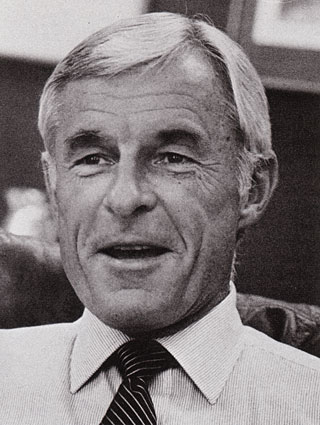
 |
Search | FAQ | US Titles | UK Titles | Memories | VaporWare | Digest | |||||||
| GuestBook | Classified | Chat | Products | Featured | Technical | Museum | ||||||||
| Downloads | Production | Fanfares | Music | Misc | Related | Contact | ||||||||
| Memories of VideoDisc - Who's Who in VideoDisc | ||||||||||||||

Grant Tinker was Chairman and CEO of NBC and a member of the RCA Board of Directors during some of the years the CED system was on the market.
While Grant Tinker's career in television spans more than thirty years and a number of positions in network programming and production, he is best known for his work in the 1970s and 1980s as founder and president of MTM Enterprises and as "the man who saved NBC" when he served as the network's chairman and CEO from 1981 to 1986. Throughout his career, he has been associated with the type of literate, sophisticated programming usually referred to as "quality television."
Tinker and then-wife Mary Tyler Moore formed MTM Enterprises in 1970 to produce The Mary Tyler Moore Show when she was offered a 13-episode series commitment from CBS. Tinker put into practice his philosophy of hiring the best creative people and letting them work without interference from executives at the networks or at MTM. He built MTM into a "writers' company" that produced some of the most successful and award-winning series of the 1970s and 1980s. Beginning with the writer-producer team of James Brooks and Allan Burns, who created The Mary Tyler Moore Show, Tinker and MTM nurtured the talents of a host of top writers and producers whose work would go on to dominate network television schedules and the Emmy awards through the 1990s. The staff included Gary David Goldberg, Steven Bochco, Bruce Paltrow, Mark Tinker, Hugh Wilson, Joshua Brand, and John Falsey. MTM's early hits were primarily sitcoms in the Mary Tyler Moore mold (including spinoffs Rhoda and Phyllis) as well as The Bob Newhart Show and WKRP in Cincinnati. Beginning in the late 1970s and 1980s, however, MTM produced a number of network television's most successful and innovative dramas, including Lou Grant, The White Shadow, Remington Steele, Hill Street Blues and St. Elsewhere, shows which benefitted from Tinker's combination of benign neglect of creative matters and tenacious support in dealing with the networks.
In 1981, Tinker left MTM to become chair and chief executive officer of NBC, the perennial last-place network. With no shows in the Nielsen top ten, and only two in the top 20, NBC had suffered through a season of dismal profits (one-sixth the level of ABC's or CBS's) and affiliate defections. Based on the belief that good quality programming makes a strong network, Tinker worked with programming chief Brandon Tartikoff to revitalize NBC's primetime schedule. They allowed low-rated but promising series to remain on the schedule until they built an audience, and courted the best producers to supply the network with programs. Under this philosophy, NBC recovered first the upscale urban audience prized by advertisers, then industry approval with more Emmy awards than CBS and ABC combined, and finally rose to first place in the ratings with blockbusters like the famed Thursday night lineup--Cosby, Family Ties, Cheers, Night Court, and Hill Street Blues-- billed as "the best night of television on television." That his programming strategy relied heavily on work from MTM (Hill Street, St. Elsewhere and Remington Steele) and MTM alumni (Goldberg's Family Ties, Charles Burrows' and Glen and Les Charles' Cheers ) eventually cost Tinker his share of MTM, which NBC parent RCA ordered him to sell in the early 1980s. Still, NBC's turnaround helped shore up the network system in an era when new programming alternatives such as cable and VCRs had begun eroding the once-monolithic network audience. Tinker left NBC in 1986, shortly after it had been acquired by General Electric.
This stint as chairman and CEO was not Tinker's first with NBC. In 1949, after graduation from Dartmouth, he became the network's first executive trainee, learning about each of its departments before settling into a job in the network's night operations. He left the network in 1951 for employment in a series of production and programming jobs in radio, television, and advertising. He served as director of program development at McCann Erickson in the early 1950s when advertisers were responsible for producing much of the networks' schedules and at Warwick and Legler to rehabilitate Revlon's corporate image after it had been tarnished in the quiz show scandals. He also served as Benton and Bowles's vice president in charge of programs where, among others, he was involved in developing Proctor and Gamble's The Dick Van Dyke Show, and where he met his second wife, Mary Tyler Moore.
Tinker returned to NBC in the early 1960s as West Coast head of programs, where he was responsible for program development of a number of popular series, including Bonanza, I Spy, Dr. Kildaire and The Man from U.N.C.L.E. After returning to New York to serve as the network's vice president in charge of programs, he left NBC to work as a production executive at Universal (where he was instrumental in birthing It Takes a Thief and Marcus Welby, M.D. as well as The ABC Movie of the Week) and 20th Century-Fox, before forming MTM in 1970.
After serving as NBC chairman and chief executive officer, Tinker tried to repeat his success with MTM Enterprises by forming GTG (Grant Tinker-Gannett) Entertainment with the communications giant, which produced the syndicated news magazine USA Today on TV and the dramatic program WIOU, which aired for a short time on CBS. The partnership was dissolved in 1990.
- The Encyclopedia of Television (1997 edition)
If you have some additional information to supply on Grant Tinker, feel free to submit the form below, so your comments can be added to this page.
Send your comments in email via the Contact page